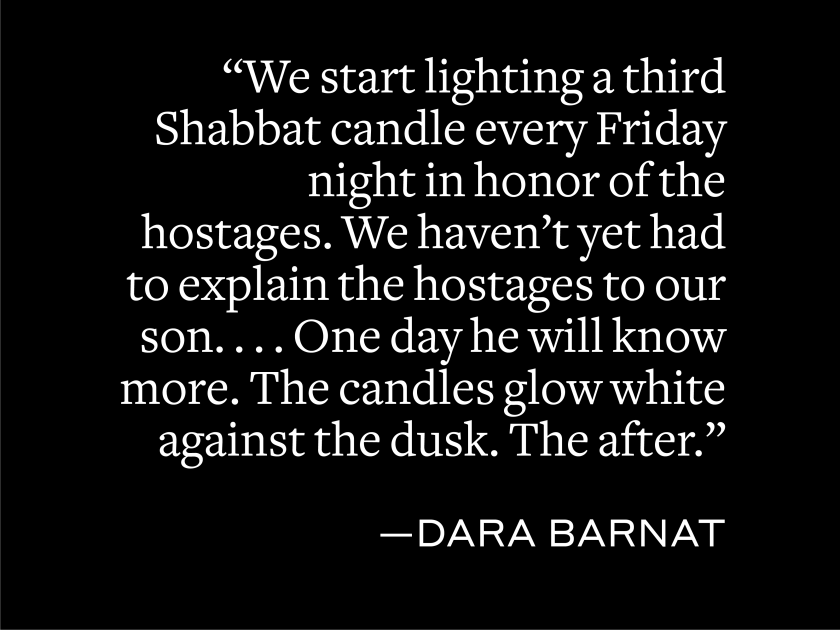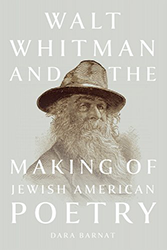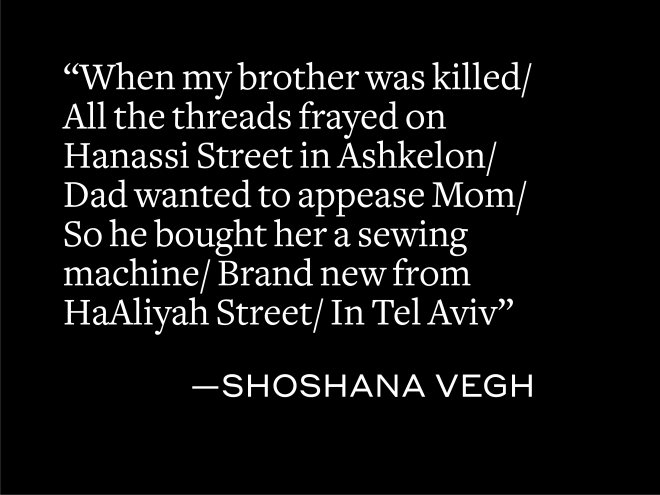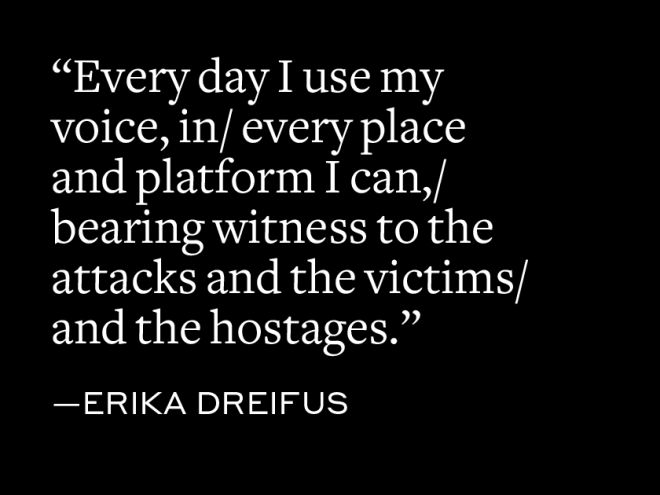
This piece is part of an ongoing series that we are sharing from Israeli authors and authors in Israel.
It is critical to understand history not just through the books that will be written later, but also through the first-hand testimonies and real-time accounting of events as they occur. At Jewish Book Council, we understand the value of these written testimonials and of sharing these individual experiences. It’s more important now than ever to give space to these voices and narratives.
In collaboration with the Jewish Book Council, JBI is recording writers’ first-hand accounts, as shared with and published by JBC, to increase the accessibility of these accounts for individuals who are blind, have low vision or are print disabled.
October 7th
There seems to be a before. There seems to be an after. I woke up at 4:00 in the morning. Something doesn’t feel right. I don’t fall back to sleep. Tel Aviv is where I’ve lived for almost my entire adult life, with some back and forth between here and New York. This is the city where I am a mother, where I lecture, research, and write at Tel Aviv University. It is where our son was born on October 7th, six years earlier in a Tel Aviv hospital. Having not grown up here, I am an outsider in many ways. Yet the city is part of me and I, it. I’ll never know if it was a coincidence that I woke up so early, or if something in the air had shifted and I was attuned to the shift. Too quiet.
______
Around 6:30 the first loud sirens rang out. Though I was awake, we were caught by surprise. Maybe it’s a false alarm. This doesn’t make sense, my husband and I say to each other. The second time they go off we get our son and our small dog, who is barking like crazy, into the hallway of our building. There is no room designed as a bomb shelter in our apartment, but the stairwell is protected, so that’s where we decide to go. Various neighbors are in the hallway in their pajamas, looking somewhat perplexed. There must have been booming sounds that followed the sirens and the Iron Dome activating, but I don’t remember. Still— I guess — the before.
______
Then, more quiet. I’ve lived here for long enough that, even after the sirens, I’m not extremely concerned. There are no other alarms in our neighborhood for about half an hour, so after some deliberating, I decide to go to the usual 8:00 a.m. class at the nearby gym. Either I believed — or wanted to believe — that things would be fine. I don’t know. The gym instructor made it there. Stretches and weights. Still the before.
______
I kept my phone next to me on the gym mat, just in case (of what, I also don’t know). 8:30 – 8:45 —a flood of texts starts coming in. Colleagues, friends, family. There are sirens in other neighborhoods, though not ours in north Tel Aviv. They are in shelters. I drive home. The weather is hot. The sky blank, overcast. Still the before.
______
The news starts coming in. On TV, journalists are reporting that people in the south of the country are being attacked, hiding in shelters. There’s gun fire and an invasion of armed terrorists. Families, children. They are asking, Where is the government?Where is the military?Why are we alone? Who is coming to help us?
______
We keep earphones in, so our son won’t hear one second of the news. His Hebrew is much better than mine. He was born here, after all. We’d had an early birthday party for him in New York, but we were baking a chocolate cake to bring to a family gathering. He was decorating a cake with sprinkles as this news was streaming in. Young people at a party were violently attacked, killed. What? We put a silver candle on top of the cake in the shape of a six.
______
All day, journalists are reporting that people are calling and texting. The utter brutality of the attacks. Murders, and brutal desecrations of bodies by Hamas, women’s bodies. Hundreds murdered. Far beyond what my heart or mind can comprehend. Then, tens of people taken. A dozen. Over a hundred. Over two hundred. Sparing no one. Babies and children. Sons, daughters, mothers, fathers, grandparents. Jewish and non-Jewish. Bedouin people and Thai workers. A Palestinian medic. Now over two hundred and forty hostages.
______
Sometime that afternoon, there seems to be no choice but to tell our son that a war has broken out. It was both sudden and not sudden. I’m sorry, I want to say, but I’m not sure why. It was a Saturday. So that’s already the after, I guess.
October 8th to 12th
In the first days after that day, it was impossible to do much else except read the news and more news and check in with people. And to organize the house for a potentially long, serious war. I wished my grandmother were alive, so I could talk to her about what was going on. I get emergency flashlights and bottled water. Nobody could say what was going to happen.
______
From time to time as I shop and try to think what we might need–in case in case in case–lines from a poem by Tuvia Ruebner run through my mind. The list of those in Ruebner’s family who were murdered in the Holocaust — a list of atrocities:
My father was murdered.
My mother was murdered.
My sister was murdered.
My grandfather was murdered.
My grandmother was murdered.
I can’t articulate how I am feeling or write anything, but I viscerally feel the lines by Ruebner. The after.
October 13th to 15th
The start of the academic year is postponed. This has never happened in the twenty years that I have been a student and then faculty. I’m saddened thinking about teaching. For so many of my fellow lecturers, writers, poets, scholars, and translators, the classroom is a refuge, a space in which to cultivate (albeit imperfectly) equality, communication, and empathy, above all.
I think about two decades of conversations I’ve had in class about poetry, politics, and democracy, with students of so many cultures, backgrounds, and ethnicities — Hebrew-speakers, Arabic-speakers, Russian-speakers, Chinese-speakers. Reading Joy Harjo and Juan Felipe Herrera. Marge Piercy, Allen Ginsberg, Naomi Shihab Nye. Tuvia Ruebner. Muriel Rukeyser. Mahmoud Darwish. Walt Whitman — lots of Whitman. Has this all been lost?
______
I write something on Facebook about how I am grateful for the soldiers who are risking their lives for the hostages and for all of us. And I am afraid that too strong of a retaliation will lead to a humanitarian crisis and potentially worsen any chance for a secure future for generations to come.
October 16th to 17th
Time is like water. I lose track of an entire Wednesday. People talk about the shock they are experiencing. The university sends an email asking for one person from every program or department to report if someone — God forbid — is wounded or killed in the war. We decide that Dorin, our head administrator, will do it. And there are deaths from our university and others. So many others. The names coming in by text and over email, one by one. Ruebner’s list.
______
I still can’t write. I recall Whitman’s elegy to Abraham Lincoln: “When Lilacs Last in the Dooryard Bloom’d,” “I mourned, and shall mourn.” I realize that oh, I must be in mourning and shall forever mourn, like Whitman for Lincoln, “With ever-returning spring.”
______
More news comes in about the hostages. So many people taken, most not returned. So many funerals. Posters of the hostages’ faces start going up around the neighborhood and on campus.
______
Our son has no school. We try to maintain some kind of schedule for him, but it’s nearly impossible. We keep the harness and leash on our dog, so we don’t have to put it on every time there’s a siren. She learns quickly to go to the front door when it happens. Our son holds her leash in the hallway. We see the same neighbors every time with their kids. We talk about the weather, and how close or far away the booming is this time. It’s usually very loud.
October 18th to 19th
Biden arrives. I’m hoping it somehow mediates the response by the current government, which is filled with many people that I have little faith in, sadly. My mother calls and asks if we’ve had sirens that day. It’s almost routine. The whole family abroad is scared for us. I say it’s worse on the news. That is sort of true.
______
I have always been avidly opposed to the right-wing politics of this country — any country. That is not new for me or for hundreds of thousands of people here. What happened to the marches for democracy? It seems like the hashtags have gone from #noacademywithoutdemocracy to #bringthemhome in the blink of an eye. I had always hoped for two peaceful co-existing states — is that idea irrevocably shattered?
October 20th to 21st
We start lighting a third Shabbat candle every Friday night in honor of the hostages. We haven’t yet had to explain the hostages to our son. We say that the third candle is for the chayalim—the soldiers. That is also true. One day he will know more. The candles glow white against the dusk. The after.
______
I don’t sleep much. I worry about my family and friends everywhere. When they write to me, as many do, I tell them to be careful, too. I fear the violence that might be triggered by what is happening here. I worry about antisemitism increasing in so many places, in schools, campuses, synagogues, and online.
October 22nd to 27th
Sari comes to Tel Aviv for a few days to work on a story about the hostages. We walk on the boardwalk, forgetting that we might have to run for cover any moment. We talk about the word in Hebrew for siren—azakah. Ashley calls and texts from L.A. Are you okay? I say something like, No, but we’re doing better than a lot of people. We talk about the war and politics and writing. She asks why we don’t leave Tel Aviv — go to New York for a bit. A reasonable question. I maybe say something like, Our family, our lives and livelihoods are here. We are rooted here in a million ways.
______
Things start to open bit by bit. One of the instructors at the gym cries at the end of the class. A bunch of people gather around her. She has friends who were killed. There is a song she starts playing in Hebrew at the end of every class, Na’avor gam et zeh…ze katan aleinu. We will get through this too…it’s nothing we can’t handle. The after.
October 28th to November 2nd
People seem to be more anxious and on edge. A guy at the gas station yells at me to move my car, but I can’t. It was blocked by another empty car. Do I simply forgive him because of this profoundly stressful time? I don’t yell back, but neither do I move until I get gas. What are the boundaries and borders of compassion?
______
On the way home from the gas station, I think about Theodor Adorno and writing poetry after Auschwitz. I still can’t write, which maybe has something to do with what Adorno says about poetry after the Holocaust being barbaric. The gap between this war and the poetic feels unbridgeable to me. I also ask myself whether — as a Jewish American female writer, with family who perished in the Holocaust, who makes a life in Tel Aviv — it is a type of privilege to be able to think about Adorno. Yes. And no. The after.
______
Our son starts to have school a few hours a day. The teachers are trained to get the kids into shelters at school when there are sirens. That happens many times. Parents get a text during or right after.
______
At the playground, he sees a poster of a toddler-age hostage tacked to a tree, with a yellow ribbon on it. What is that?Is she lost? he asks. I say it has to do with the war. I don’t have time to think of what to say. He has to get into school before I have time to answer honestly, yet dishonestly. I feel as if I’ve failed him.
November 3rd to 6th
Yellow ribbons are tied to cars for the missing hostages. Posters of those who are missing are everywhere. Their faces are on the roundabout between my son’s school, campus, and home.
______
Suddenly, all I can think about is writing something. A testimony. A personal, partial narrative of what happened from my subjective, limited standpoint. In a lot of ways meaningless, but at least my own. Perhaps in the telling itself there is power. Also, there are people starting to question and deny the violence and sexual assaults, against women in particular, on October 7th.
November 7th to 14th
I come across a song by a singer, Rose Betts, on Instagram. One of the songs has a line, Take this body home. I listen to the song over and over. It’s one of the only times that I can’t stop crying.
______
It’s announced that Vivian Silver, the peace activist, was amongst those murdered. How does one go about making peace now? Maybe at the gas station. Maybe still through poetry, literature, and language. In the classroom. I decide to make a choice to keep trying when I can in miniscule ways. A personal, daily peace, if that matters at all.
November 15th to 19th
News sites that I read all day announce a deal for a cease-fire and possible return of some of the hostages. I pray that this time it’s true. The start of the academic year is postponed again.
______
Our son stares up at the posters of the hostages in our neighborhood. Why is a baby in a war, Mama? he asks. What my husband and I have decided is to say something like: There were hostages taken on a specific day, and there are people working hard to bring them back. This was a war that started before you were born, before we were born.
I would give anything to give him and children everywhere safety and peace.
______
There is more to say, less to say.
November 20th to 30th
Some of the hostages come back, including children. Collective breaths are inhaled, exhaled, inhaled, exhaled. Some are let free. Some, but not all the women and children. We hear helicopters overhead bringing them to hospitals around Tel Aviv. Hallelujah.
______
Many, many are captive still. The situation is worse than ever. There was a ceasefire and it’s about to be over. So much has gone horribly wrong. I don’t know what comes next, exactly.
______
My son says to me one afternoon, There are so many posters, my brain hurts. I say, Yes, I understand. My brain hurts, too, my love.
______
The after, after, after.
______
Notes
Excerpts and references in this piece are from, in the order they appear: Tuvia Ruebner’s untitled poem that starts “My father was murdered” from In the Illuminated Dark: Selected Poems of Tuvia Ruebner, translated by Rachel Tzvia Back (Hebrew Union College Press, 2014), pp. 203 – 205; Walt Whitman, “When Lilacs Last in the Dooryard Bloom’d,” Leaves of Grass (1891−92), The Walt Whitman Archive, whitmanarchive.org; the Hebrew-language song “Ze Katan Aleinu” (זה קטן עלינו) by Liraz Russo and Jordan Peleg; and the singer Rose Betts, who can be found on Instagram (@rosebettsmusic) and elsewhere.
The views and opinions expressed above are those of the author, based on their observations and experiences.
Support the work of Jewish Book Council and become a member today.
Dara Barnat is a scholar of poetry and a poet, who holds a Ph.D. from Tel Aviv University, where she is a senior faculty member and serves as Head of the Division of Languages. Dara is the author of three poetry collections: The City I Run From: Poems of Tel Aviv (2020), In the Absence (2016), and Headwind Migration (2009). Dara’s scholarly book, titled Walt Whitman and the Making of Jewish American Poetry, was published by the University of Iowa Press (Iowa Whitman Series) in 2023. Other work appears in The Oxford Handbook of Walt Whitman, Walt Whitman Quarterly Review, Poet Lore, Los Angeles Review of Books, and elsewhere. darabarnat.com



